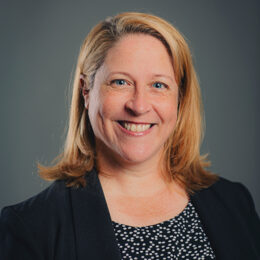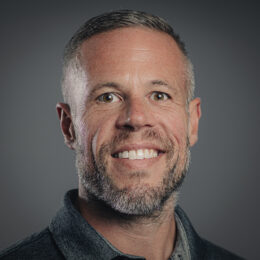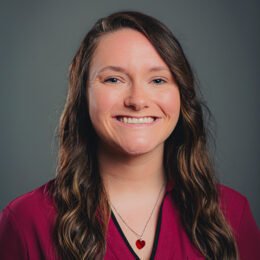Nursing Education That Goes Well Beyond the Classroom
At Manchester University, we’re equipping the next generation of nurses with the high-tech training, expert faculty guidance and community-mindedness to best serve at the forefront of health care.
And we’re helping nursing students get there faster with our Accelerated Bachelor of Science in Nursing (ABSN) degree program—students with a bachelor’s degree in another field or who have no other degree but have completed at least 60 credit hours can earn their ABSN in just 16 months.
Our traditional Bachelor of Science in Nursing (TBSN) Program offers students of all backgrounds a well-rounded education in pursuit of a nursing degree.
Manchester is committed to training each nursing student to provide high-level, compassionate care to all populations. All students have a community engagement course where they go out into the community and volunteer at various locations.

Nursing Accreditation
Accreditation Status: The Traditional Bachelor of Science in Nursing Program and and Accelerated Bachelor of Science in Nursing Program at Manchester University are accredited by the Commission on Collegiate Nursing Education (https://www.ccneaccreditation.org).
Manchester Nursing Opportunities for Scholarship
For High School Seniors Applying to the Nursing Program
For Current Nursing Program Students
For Adult (non-traditional) Nursing Program Students
For Accelerated BSN Students
For International Students
Other Resources for Scholarships
Traditional BSN Program
Program Overview and Progression
As a nursing major, you’ll have access to facilities and resources at Manchester’s North Manchester campus and Fort Wayne location, the hub of MU’s health sciences programs.
Freshman year begins with an introduction to the nursing career and a focus on completing Manchester Core requirements as well as pre-nursing preparatory classes.
In the fall of your sophomore year, you’ll begin to take nursing-specific courses and, in the spring semester, attend clinicals.
Junior and senior year, you’ll be fully immersed in the nursing program and interprofessional health care experiences. You’ll also be participating in clinical and academic experiences at off-campus health care venues.
Student Groups and Campus Involvement
Nursing students at Manchester University have several opportunities to connect outside the classroom through student-led organizations and leadership roles. These groups support academic success, professional development, and peer collaboration throughout the BSN journey.
Key opportunities include:
- Student Nurses Association (SNA): Offers leadership experience, networking, and service learning in the nursing community. Members attend state and national conventions and participate in volunteer activities.
- Manchester University Nursing Honor Society: Recognizes academic excellence and leadership potential among junior and senior nursing students.
- Peer Mentorship Programs: Upper-level nursing students often serve as mentors for underclassmen, helping with academic preparation and clinical transition.
- Health and Wellness Club: A multidisciplinary student organization promoting campus-wide wellness education, open to all health profession majors.
These organizations help BSN students build relationships, gain practical leadership skills, and make lasting contributions to the campus and local healthcare communities.
Clinical Experience, Lab Resources, and Learning Technology
Students train in simulation labs on both the Fort Wayne and North Manchester campuses using high-tech manikins that simulate realistic patient responses. Clinical experiences occur at regional hospitals, clinics, and rehab centers in both urban and rural settings. Coursework is delivered through Canvas, supported by 24/7 tech assistance.
Inside Our Nursing Labs
Manchester nursing students practice basic and advanced skills in state-of-the art nursing labs on both the North Manchester and Fort Wayne campuses. Training equipment includes high-tech nursing simulation manikins that can mimic human reaction to illness – including the ability to cry, sweat and bleed. This practice before entering a hospital or clinical setting builds student confidence and promotes better patient care.
%
%
%
Accelerated BSN Program
Traditional BSN Overview and Key Differences
In contrast, the Accelerated BSN is a full-time, 16-month second-degree program designed for individuals who already hold a bachelor’s degree. While the curriculum content is the same, the pace and structure differ significantly.
ABSN Courses and Curriculum
Manchester’s Accelerated BSN (ABSN) is a 65-credit, full-time, 16-month program designed to fast-track your career in nursing. The curriculum is carefully sequenced for comprehensive learning, blending theory, lab experience, and clinical practice.
Fall (Year 1 – 15 credits)
- NURS 125: Introduction to Nursing (online, 3 credits) – Covers nursing roles, medical terminology, the nursing process, ethics, and APA writing.
- NURS 210: Pathophysiology for Nursing (3 credits) – Focus on disease across the lifespan and system homeostasis.
- NURS 216: Health Assessment (4 credits) – Teaches history, physical exam, cultural competence, and health promotion in lab.
- NURS 220: Fundamentals of Nursing (5 credits) – Hands-on practice, documentation, infection control, and clinical reasoning.
January Session (2 credits)
- NURS 200: Nursing Calculations – Medication math, legal/ethical concepts in drug administration.
Spring (17 credits)
- NURS 300: Maternal Newborn & Women’s Health (4 credits)
- NURS 305: Pharmacology for Nursing (3 credits)
- NURS 320: Adult Health I (6 credits, 126 clinical hours)
- NURS 400: Pediatric Nursing (4 credits)
Summer (17 credits)
- NURS 325: Adult Health II (6 credits, 126 clinical hours)
- NURS 330: Mental Health & Wellness (4 credits)
- NURS 405: Research for Evidence-Based Practice (3 credits)
- NURS 410: Community Nursing (4 credits, 42 clinical hours)
Fall (Year 2 – 14 credits)
- NURS 430: Critical Care Nursing (4 credits)
- NURS 440: NCLEX & Practice Preparation (3 credits)
- NURS 450: Capstone Practicum & Leadership (7 credits, 168 clinical hours)
Program Requirements:
- Students must maintain a minimum 3.0 GPA, with all core nursing courses requiring a grade of C or higher.
- A 75% average on all course exams is mandatory.
- The program includes 756 total clinical hours across multiple internsemesters.
- 65 credit hours total.
This rigorous curriculum equips students with deep clinical insight, strong critical thinking, and professionalism—all culminating in a capstone experience and preparation for the NCLEX licensure exam.
Student Community, Advising, and Support Resources
Clinical Experience, Lab Resources, and Learning Technology
Mission and Philosophy
Mission
The mission of the Nursing Program is to prepare future nurses to respect the infinite worth of every individual, and to practice nursing by drawing on their faith to lead principled, productive and compassionate lives that inspire them to be servant leaders within the nursing profession.
Vision
To improve the human condition through service
Our Philosophy
We believe that excellence in nursing education is achieved through the purposeful dedication of nursing faculty and their commitment to teaching, student success, scholarship, and service to the community. We are committed to the value of high academic expectations and professional preparation to provide graduates with the necessary skills to lead healthy, productive and principled lives. Through dedication and fostering of this next generation of nurses, we are advancing the science and art of nursing through the empowerment of individuals, families, communities, and populations within our region, the nation, and the world.


Conceptual Model
The four concepts that comprise the conceptual framework of the Manchester University Nursing Program include individual/community, environment, health, and nursing.
Individual
The individual is recognized as having inherent dignity, value, and purpose. Individuals self-actualize through the integration of relationships, and functioning within families, groups and communities.
Community
Community promotes positive self-identity, empowering individuals to evolve as healthy in mind, body and spirit.
Environment
Environment encompasses internal and external determinants that are constantly changing, affecting the individual’s physical, psychological, spiritual elements (internal) and (external) variables including cultural, social, biophysical, political, and economical. Nursing can serve as a resource to influence health promotion and maintenance within the environment.
Health
Health represents a dynamic and holistic phenomenon with balance between the individual and the environment. An individual’s health exists upon a continuum of optimal wellness to illness, disease, dysfunction and changes occurring throughout an individual’s life span, including end of life.
Nursing
Nursing is an interactive, interpersonal approach to assist individuals to achieve optimal health and wellness through compassionate, nurturing evidence-based holistic nursing care. Nursing education expounds upon the humanities, sciences, and liberal education courses, which are necessary to appreciate the holistic nature of the individual. Nursing faculty believe that excellence in nursing education stimulates the spirit of inquiry and lifelong learning. Respect for multiple perspectives guides students and faculty to provide effective intercultural care, contribute to local and global efforts to eliminate health disparities and advocate for vulnerable populations.
BSN Program Outcomes
THE LEARNER WILL:
- Demonstrate an understanding of the discipline of nursing’s distinct perspective and where shared perspectives exist with other disciplines, apply theory and research-based knowledge from nursing, the arts, humanities, and other sciences, and demonstrate clinical judgment founded on a broad knowledge base. (Knowledge for Nursing Practice)
- Engage with the Individual in establishing a caring relationship, communicate effectively with individuals, integrate assessment skills in practice, diagnose actual or potential health problems and needs, develop a plan of care, demonstrate accountability for care delivery, evaluate outcomes of care, promote self-care management, and provide care coordination. (Person-Centered Care)
- Manage population health, engage in effective partnerships, consider the socioeconomic impact of the delivery of health care, advance equitable population health policy, demonstrate advocacy strategies, and advance preparedness to protect population health during disasters and public health emergencies. (Population Health)
- Advance the scholarship of nursing, integrate the best evidence into nursing practice, and promote the ethical conduct of scholarly activities. (Scholarship for the Nursing Discipline)
- Apply quality improvement principles in care delivery, contribute to a culture of patient safety, and contribute to a culture of provider and work environment safety. (Quality and Safety)
- Communicate in a manner that facilitates a partnership approach to principles and values of team dynamics, use knowledge of nursing and other professions to address healthcare needs, and work with other professions to maintain a climate of mutual learning, respect, and shared values. (Interprofessional Partnerships)
- Apply knowledge of systems to work effectively across the continuum of care, incorporate consideration of cost-effectiveness of care, and optimize system effectiveness through application of innovation and evidence-based practice. (Systems-Based Practice)
- Describe the various information and communication technology tools used in the care of patients, communities, and populations; use information and communication technology to gather data, create information, and generate knowledge; use information and communication technologies and informatics processes to deliver safe nursing care to diverse populations in a variety of settings; use information and communication technology to support documentation of care and communication among providers, patients, and all system levels; and use information and communication technologies in accordance with ethical, legal, professional, and regulatory standards, and workplace policies in the delivery of care. (Informatics and Healthcare Technologies)
- Demonstrate an ethical comportment in one’s practice reflective of nursing’s mission to society, employ a participatory approach to nursing care, demonstrate accountability to the individual, society, and the profession, comply with relevant laws, policies, and regulations, demonstrate the professional identity of nursing, and integrate diversity, equity, and inclusion as core to one’s professional identity. (Professionalism)
- Demonstrate a commitment to personal health and well-being and demonstrate a spirit of leadership. (Personal, Professional, and Leadership Development)










